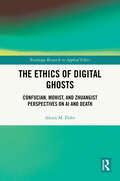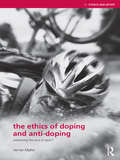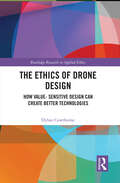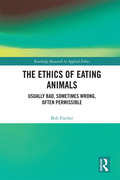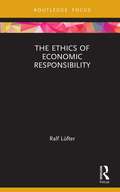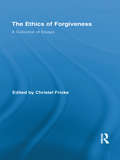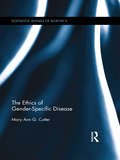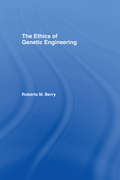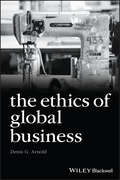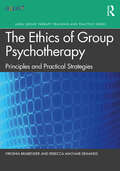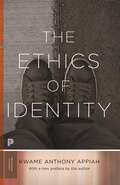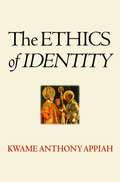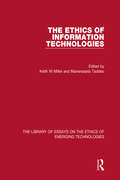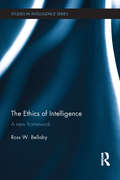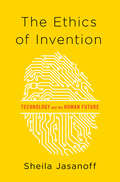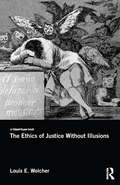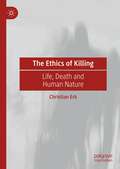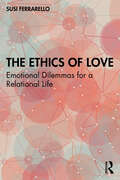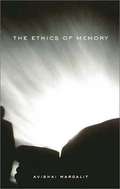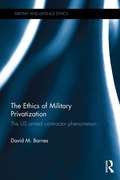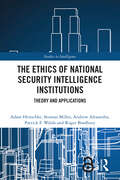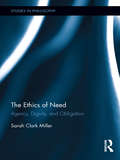- Table View
- List View
The Ethics of Digital Ghosts: Confucian, Mohist, and Zhuangist Perspectives on AI and Death (Routledge Research in Applied Ethics)
by Alexis M. ElderAdvances in artificial intelligence (AI) are enabling the construction of “digital ghosts”: algorithmic reconstructions of deceased individuals based on patterns of interaction in their text messages, social media posts, and other personal data. This book develops an ethics of digital ghosts using resources from classical Chinese philosophy.Bereaved people have reported that conversations with digital ghosts can be surprisingly comforting and beneficial. However, there are concerns that they can be harmful, whether by preventing a hard but necessary acknowledgment of loss, producing ongoing dependence, or encouraging instrumentalization of our beloved dead. Building on some suggestive comparisons between digital remains and physical remains, this book uses resources from classical Chinese philosophy to connect concerns from funerary ethics to those presented by AI today. Confucianism, Mohism, and Zhuangism were remarkable for their rich, detailed discussions of the ethics of handling physical remains. This book updates and extends these concerns to apply to digital ghosts. It explores topics including the role of rituals and traditions in communal mourning, the epistemic consequences of fragmented standards for remembrance and data reuse, and the value of creative transformation and adaptation. The result is a psychologically plausible, culturally informed, and afterlife-neutral grounding for thinking about the ethics of digital ghosts.The Ethics of Digital Ghosts will appeal to researchers and graduate students working in applied ethics, moral psychology, philosophy of technology, technology and AI ethics, cross-cultural philosophy, and classical Chinese philosophy.
The Ethics of Doping and Anti-Doping: Redeeming the Soul of Sport? (Ethics and Sport)
by Verner MøllerWith every positive drugs test the credibility and veracity of modern elite sport is diminished. In this radical and provocative critique of current anti-doping policy and practice, Verner Møller argues that the fight against doping – promoted as an initiative to cleanse sport of cheats – is at heart nothing less than a battle to save sport from itself, located on the fault-line between the will to purity and the will to win. Drawing on extensive and detailed case studies of doping in sport, and using a highly original blend of conceptual ideas from philosophy and sociology, Møller strongly criticises current anti-doping regimes and challenges our commonly held ideas about the nature of sport and the risks posed by drugs to health and fair play. He argues forcefully that we must understand the precarious position of the athlete and that only by containing coaches, doctors and drug companies within the anti-doping regime can we hope to ever make progress on this most important issue. Written in a lively and engaging style, and skilfully blending empirical case studies with cutting edge theory, this book represents an important statement on the nature of sport, morality and modernity. It is important reading for all serious students and scholars of the ethics, sociology and politics of sport.
The Ethics of Drone Design: How Value-Sensitive Design Can Create Better Technologies (Routledge Research in Applied Ethics)
by Dylan CawthorneThis book presents a holistic approach to the design and use of drones. It argues that this powerful technology requires high levels of ethical analysis and responsibility – our moral progress must keep pace with our technological progress. Drone technologies support and diminish the flourishing of certain human values, impact power relations between individuals and groups, and add an additional element to the complex network of humans and objects in modern society. The book begins by introducing four prototype drones designed and built by the author: the healthcare drone, the search and rescue drone, the educational drone, and the spiritual drone. These drones have been developed using a value-sensitive design approach – with values such as human welfare, privacy, trust, environmental sustainability, and justice at the forefront. Ethical analyses and social impacts are taken as design inputs, leading to the creation of better, more responsible drone designs. The book then showcases additional methods used to develop the prototype drones from the fields of engineering, ethics, and art, including ethical frameworks, ethics standards, capability caution, and speculative design. The holistic approach reveals a more subtle and nuanced view of drones than the currently polarized characterization of "the good drone" or "the killer drone". The book concludes with recommendations for drone engineers, companies, lawmakers, and citizens on how to support ethics in drone design. The Ethics of Drone Design is an essential resource for scholars, advanced students, engineers, and designers interested in the ethics of technology.
The Ethics of Drone Design: How Value-Sensitive Design Can Create Better Technologies (Routledge Research in Applied Ethics)
by Dylan CawthorneThis book presents a holistic approach to the design and use of drones. It argues that this powerful technology requires high levels of ethical analysis and responsibility – our moral progress must keep pace with our technological progress. Drone technologies support and diminish the flourishing of certain human values, impact power relations between individuals and groups, and add an additional element to the complex network of humans and objects in modern society. The book begins by introducing four prototype drones designed and built by the author: the healthcare drone, the search and rescue drone, the educational drone, and the spiritual drone. These drones have been developed using a value-sensitive design approach – with values such as human welfare, privacy, trust, environmental sustainability, and justice at the forefront. Ethical analyses and social impacts are taken as design inputs, leading to the creation of better, more responsible drone designs. The book then showcases additional methods used to develop the prototype drones from the fields of engineering, ethics, and art, including ethical frameworks, ethics standards, capability caution, and speculative design. The holistic approach reveals a more subtle and nuanced view of drones than the currently polarized characterization of "the good drone" or "the killer drone". The book concludes with recommendations for drone engineers, companies, lawmakers, and citizens on how to support ethics in drone design. The Ethics of Drone Design is an essential resource for scholars, advanced students, engineers, and designers interested in the ethics of technology.
The Ethics of Eating Animals: Usually Bad, Sometimes Wrong, Often Permissible (Routledge Research in Applied Ethics)
by Bob FischerIntensive animal agriculture wrongs many, many animals. Philosophers have argued, on this basis, that most people in wealthy Western contexts are morally obligated to avoid animal products. This book explains why the author thinks that’s mistaken. He reaches this negative conclusion by contending that the major arguments for veganism fail: they don’t establish the right sort of connection between producing and eating animal-based foods. Moreover, if they didn’t have this problem, then they would have other ones: we wouldn’t be obliged to abstain from all animal products, but to eat strange things instead—e.g., roadkill, insects, and things left in dumpsters. On his view, although we have a collective obligation not to farm animals, there is no specific diet that most individuals ought to have. Nevertheless, he does think that some people are obligated to be vegans, but that’s because they’ve joined a movement, or formed a practical identity, that requires that sacrifice. This book argues that there are good reasons to make such a move, albeit not ones strong enough to show that everyone must do likewise.
The Ethics of Economic Responsibility (Economics and Humanities)
by Ralf LüfterThe Ethics of Economic Responsibility raises fundamental ethical questions related to the conceptualization of economic responsibility, that is: the imperative to fulfil certain economic obligations. It builds on a basic characterization of the question of ethics in order to introduce responsibility as a constitutive element for a new determination of economic knowledge. Drawing on the metaphysical tradition of philosophy, the book explores the distinction between "operability-based-responsibility" and "end-in-itself-based responsibility" and also considers what is tentatively called "being-related responsibility". By presenting these arguments about the notion of economic responsibility, the book contributes to the growing calls for ethical questions to not be merely complementary to the ongoing discourse of economic sciences, but rather to sit at its core, in such a way as to restore the intrinsic ethical dimension of economics itself. The book marks a significant contribution to the literature on the philosophy of economics, applied ethics more broadly, and the critical discourse concerning mainstream economics.
The Ethics of Forgiveness: A Collection of Essays (Routledge Studies in Ethics and Moral Theory)
by Christel FrickeWe are often pressed to forgive or in need of forgiveness: Wrongdoing is common. Even after a perpetrator has been taken to court and punished, forgiveness still has a role to play. How should a victim and a perpetrator relate to each other outside the courtroom, and how should others relate to them? Communicating about forgiveness is particularly urgent in cases of civil war and crimes against humanity inside a community where, if there were no forgiveness, the community would fall apart. Forgiveness is governed by social and, in particular, by moral norms. Do those who ask to be forgiven have to fulfil certain conditions for being granted forgiveness? And what does the granting of forgiveness consist in? We may feel like refusing to forgive those perpetrators who have committed the most horrendous crimes. But is such a refusal justified even if they repent their crimes? Could there be a duty for the victim to forgive? Can forgiveness be granted by a third party? Under which conditions may we forgive ourselves? The papers collected in the present volume address all these questions, exploring the practice of forgiveness and its normative constraints. Topics include the ancient Chinese and the Christian traditions of forgiveness, the impact of forgiveness on the moral dignity and self-respect of the victim, self-forgiveness, the narrative of forgiveness as well as the limits of forgiveness. Such limits may arise from the personal, historical, or political conditions of wrongdoing or from the emotional constraints of the victims.
The Ethics of Gender-Specific Disease (Routledge Annals of Bioethics)
by Mary Ann CutterOur understanding of gender carries significant bioethical implications. An errant account of gender-specific disease can lead to overgeneralizations, undergeneralizations, and misdiagnoses. It can also lead to problems in the structure of health-care delivery, the creation of policy, and the development of clinical curricula. In this volume, Cutter argues that gender-specific disease and related bioethical discourses are philosophically integrative. Gender-specific disease is integrative because the descriptive roles of gender, disease, and their relation are inextricably tied to their prescriptive roles within frames of reference. An integrative account of gender-specific disease carries ethical implications because our understanding of gender-specific disease is evaluative, and our evaluations of gender-specific disease entail judgments concerning the praiseworthiness and blameworthiness of a clinical event. Cutter supports a "both/and" emphasis on context and integration in relation to gender-specific disease and bioethical analyses. While the text mainly focuses on gender-specific diseases that affect women, Cutter also includes examples involving men, children, and members of the LGBT community.
The Ethics of Genetic Engineering (Routledge Annals of Bioethics #Vol. 4)
by Roberta M. BerryHuman genetic engineering may soon be possible. The gathering debate about this prospect already threatens to become mired in irresolvable disagreement. After surveying the scientific and technological developments that have brought us to this pass, The Ethics of Genetic Engineering focuses on the ethical and policy debate, noting the deep divide that separates proponents and opponents. The book locates the source of this divide in differing framing assumptions: reductionist pluralist on one side, holist communitarian on the other. The book argues that we must bridge this divide, drawing on the resources from both encampments, if we are to understand and cope with the distinctive problems posed by genetic engineering. These problems, termed "fractious problems," are novel, complex, ethically fraught, unavoidably of public concern, and unavoidably divisive. Berry examines three prominent ethical and political theories – utilitarianism, Kantianism, and virtue ethics – to consider their competency in bridging the divide and addressing these fractious problems. The book concludes that virtue ethics can best guide parental decision making and that a new policymaking approach sketched here, a "navigational approach," can best guide policymaking. These approaches enable us to gain a rich understanding of the problems posed and to craft resolutions adequate to their challenges.
The Ethics of Global Business (Foundations of Business Ethics)
by Denis G. ArnoldProvides an original account of international business ethics grounded in cosmopolitan human rights theory Transnational companies (TNCs) operate in a variety of political jurisdictions and legal frameworks. As international trade and foreign direct investment (FDI) continue to increase, TNCs based in industrialized 'home' nations are gaining enormous economic and political influence in developing 'host' nations. Corporations operating internationally, particularly in nations with limited regulatory and enforcement resources, are often free to determine whether they will follow existing laws and guidelines regarding consumer protection, worker safety, and environmental protection. The Ethics of Global Business provides clear and pragmatic guidance for business leaders interested in the ethical conduct of international business. With a cosmopolitan human rights perspective on international business ethics, this comprehensive volume describes modern transnational companies, explains why companies and their leaders are responsible for company policies and practices, and presents a conceptual framework grounded in respect for basic human rights. Arnold addresses a wide range of central topics, such as the role of transnational companies in global justice, the human rights obligations of transnational companies, labor rights in global supply chains, corporate responsibility regarding global climate change, and exploitation and empowerment at the base of the global economic pyramid. Presents and defends a theory of moral legitimacy that views TNCs as agents of justice Offers an alternative ethical conception of CSR that integrates a cosmopolitan human rights perspective Provides critical and ethical analysis of recent United Nations (UN) initiatives on business and human rights including the UN tripartite framework recently approved by the UN Human Rights Council Analyzes current Base of the Pyramid (BoP) strategies Defends minimum standards for working conditions in global supply chains and analyzes wage exploitation in developing nations Demonstrates the need for ethical CSR and morally legitimate BoP business ventures that do not exploit people living in moderate and extreme poverty (MEP)The Ethics of Global Business is essential reading for business leaders, policymakers, scholars, undergraduate and graduate students, and general readers with an interest in business ethics, global justice, human rights, sweatshop ethics, solutions to global poverty, corporate environmental sustainability, and global climate change as related to transnational companies.
The Ethics of Group Psychotherapy: Principles and Practical Strategies (AGPA Group Therapy Training and Practice Series)
by Virginia Brabender Rebecca MacNair-SemandsThe Ethics of Group Psychotherapy provides group psychotherapists with the ethical and legal foundation needed to engage in effective decision-making in their everyday group practices. This text provides readers with a framework for understanding ethical dilemmas through a review of major models of ethical thinking, including principlism, feminism and the ethics of care, and virtue ethics. The authors use this foundation to explore those problems emerging most routinely in group practice, among which are safeguarding members’ personal information, protecting members’ autonomy, and helping members to process differences—particularly those related to privilege and oppression—in a way that furthers interpersonal relations and social justice. Throughout the text, practical tools such as using assessments to aid in member selection and tracking progress and outcome through measurement-based care are offered that bolster the group psychotherapist’s effectiveness in ethical decision-making. Featuring questions for discussion and items to assess the reader’s master of the material, this text will be a valuable tool in classroom and small-group learning.
The Ethics of Human Systems: Creating Economic Value with Impact for Good (Systems Thinking)
by Manel Pretel-WilsonAddressing major social and ecological issues, this book establishes the field of ethics as a fundamental science that cannot be separated from economics and business. In particular, it redefines the nature of good investments which, besides being profitable, have to realize values as opposed to reinforcing the countervalues that are destroying our world.The book develops a universal morality hypothesis constituted by four sets of universal values-countervalues that correspond to the fundamental laws of ethics. This new understanding of ethics makes human systems the architects that can save our world through doing something for others that satisfies need rather than greed. This book argues that we can realize values through providing something of value to others, that is, human systems can create economic value with impact for good.The Ethics of Human Systems is an insightful read for academics and practitioners in the fields of systems thinking, business ethics, and impact investing in particular.
The Ethics of Identity (Princeton Classics #132)
by Kwame Anthony AppiahA bold vision of liberal humanism for navigating today’s complex world of growing identity politics and rising nationalismCollective identities such as race, nationality, religion, gender, and sexuality clamor for recognition and respect, sometimes at the expense of other things we value. To what extent do they constrain our freedom, and to what extent do they enable our individuality? Is diversity of value in itself? Has the rhetoric of human rights been overstretched? Kwame Anthony Appiah draws on thinkers through the ages and across the globe to explore such questions, developing an account of ethics that connects moral obligations with collective allegiances and that takes aim at clichés and received ideas about identity. This classic book takes seriously both the claims of individuality—the task of making a life—and the claims of identity, these large and often abstract social categories through which we define ourselves.
The Ethics of Identity (Princeton Classics Ser. #132)
by Kwame Anthony AppiahRace, ethnicity, nationality, religion, gender, sexuality: in the past couple of decades, a great deal of attention has been paid to such collective identities. They clamor for recognition and respect, sometimes at the expense of other things we value. But to what extent do "identities" constrain our freedom, our ability to make an individual life, and to what extent do they enable our individuality? In this beautifully written work, renowned philosopher and African Studies scholar Kwame Anthony Appiah draws on thinkers through the ages and across the globe to explore such questions.The Ethics of Identity takes seriously both the claims of individuality—the task of making a life—and the claims of identity, these large and often abstract social categories through which we define ourselves.What sort of life one should lead is a subject that has preoccupied moral and political thinkers from Aristotle to Mill. Here, Appiah develops an account of ethics, in just this venerable sense—but an account that connects moral obligations with collective allegiances, our individuality with our identities. As he observes, the question who we are has always been linked to the question what we are.Adopting a broadly interdisciplinary perspective, Appiah takes aim at the clichés and received ideas amid which talk of identity so often founders. Is "culture" a good? For that matter, does the concept of culture really explain anything? Is diversity of value in itself? Are moral obligations the only kind there are? Has the rhetoric of "human rights" been overstretched? In the end, Appiah's arguments make it harder to think of the world as divided between the West and the Rest; between locals and cosmopolitans; between Us and Them. The result is a new vision of liberal humanism—one that can accommodate the vagaries and variety that make us human.
The Ethics of Information Technologies (The\library Of Essays On The Ethics Of Emerging Technologies Ser.)
by Keith MillerThis volume collects key influential papers that have animated the debate about information computer ethics over the past three decades, covering issues such as privacy, online trust, anonymity, values sensitive design, machine ethics, professional conduct and moral responsibility of software developers. These previously published articles have set the tone of the discussion and bringing them together here in one volume provides lecturers and students with a one-stop resource with which to navigate the debate.
The Ethics of Insurgency
by Michael L. GrossAs insurgencies rage, a burning question remains: how should insurgents fight technologically superior state armies? Commentators rarely ask this question because the catchphrase 'we fight by the rules, but they don't' is nearly axiomatic. But truly, are all forms of guerrilla warfare equally reprehensible? Can we think cogently about just guerrilla warfare? May guerrilla tactics such as laying improvised explosive devices (IEDs), assassinating informers, using human shields, seizing prisoners of war, conducting cyber strikes against civilians, manipulating the media, looting resources, or using nonviolence to provoke violence prove acceptable under the changing norms of contemporary warfare? The short answer is 'yes', but modern guerrilla warfare requires a great deal of qualification, explanation, and argumentation before it joins the repertoire of acceptable military behavior. Not all insurgents fight justly, but guerrilla tactics and strategies are also not always the heinous practices that state powers often portray them to be.
The Ethics of Intelligence: A new framework (Studies in Intelligence)
by Ross W. BellabyThis book starts from the proposition that the field of intelligence lacks any systematic ethical review, and then develops a framework based on the notion of harm and the establishment of Just Intelligence Principles. As the professional practice of intelligence collection adapts to the changing environment of the twenty-first century, many academic experts and intelligence professionals have called for a coherent ethical framework that outlines exactly when, by what means and to what ends intelligence is justified. Recent controversies, including reports of abuse at Guantanamo Bay and Abu Ghraib, allegations of extraordinary rendition programmes and the ever-increasing pervasiveness of the ‘surveillance state’, have all raised concerns regarding the role of intelligence in society. As a result, there is increased debate regarding the question of whether or not intelligence collection can be carried out ethically. The Ethics of Intelligence tackles this question by creating an ethical framework specifically designed for intelligence that is capable of outlining under what circumstances, if any, different intelligence collection activities are ethically permissible. The book examines three of the main collection disciplines in the field of intelligence studies: imagery intelligence, signals intelligence and human intelligence. By applying the ethical framework established at the beginning of the book to these three important intelligence collection disciplines, it is possible to better understand the ethical framework while also demonstrating its real-life applicability. This book will be of much interest to students of intelligence studies, ethics, war and conflict studies, security studies and IR.
The Ethics of Invention: Technology and the Human Future
by Sheila JasanoffWe live in a world increasingly governed by technology--but to what end? Technology rules us as much as laws do. It shapes the legal, social, and ethical environments in which we act. Every time we cross a street, drive a car, or go to the doctor, we submit to the silent power of technology. Yet, much of the time, the influence of technology on our lives goes unchallenged by citizens and our elected representatives. In The Ethics of Invention, renowned scholar Sheila Jasanoff dissects the ways in which we delegate power to technological systems and asks how we might regain control. Our embrace of novel technological pathways, Jasanoff shows, leads to a complex interplay among technology, ethics, and human rights. Inventions like pesticides or GMOs can reduce hunger but can also cause unexpected harm to people and the environment. Often, as in the case of CFCs creating a hole in the ozone layer, it takes decades before we even realize that any damage has been done. Advances in biotechnology, from GMOs to gene editing, have given us tools to tinker with life itself, leading some to worry that human dignity and even human nature are under threat. But despite many reasons for caution, we continue to march heedlessly into ethically troubled waters. As Jasanoff ranges across these and other themes, she challenges the common assumption that technology is an apolitical and amoral force. Technology, she masterfully demonstrates, can warp the meaning of democracy and citizenship unless we carefully consider how to direct its power rather than let ourselves be shaped by it. The Ethics of Invention makes a bold argument for a future in which societies work together--in open, democratic dialogue--to debate not only the perils but even more the promises of technology.
The Ethics of Justice Without Illusions
by Louis E. WolcherThe founding premise of this book is that the nimbus of prestige, which once surrounded the idea of justice, has now been dimmed to such a degree that it is no longer sufficient to secure the possibility of a good conscience for those who undertake, in good faith, to make the world a better place in the spheres of politics and law. The many decent human beings who have noticed and experienced this diminishment of justice’s prestige find themselves in a thoroughly disenchanted existential situation. For them, the attempt to do justice without the illusion of being grounded in something beyond the sheer facticity of their own performances is a distinctly ethical theme, which cries out to be investigated in its own right. Heeding the cry, this book asks and attempts to answer the following fundamental ethical question: is a life in the law – even one spent in the pursuit of justice – worth living, and if so, how can a disenchanted person come to bear the living of it without constantly having to engage in self-deception? If Nietzsche is right that living without illusions is impossible for human beings, then the most important ethical implication of this essentially anthropological fact goes far beyond the question of what illusions we ought to choose. It must also include the question of whether we should succumb to that most seductive and pernicious of all illusions: namely, the belief that exercising great care and responsibility in choosing our illusions – which we might then call our ‘principles of justice’ – excuses us ethically for what we do to others in their name. The culmination of a 10 year legal-philosophical project, this book will appeal to graduate students, scholars and curious non-academic intellectuals interested in continental philosophy, critical legal theory, postmodern theology, the philosophy of human rights and the study of individual ethics in the context of law.
The Ethics of Killing: Life, Death and Human Nature
by Christian ErkIn this book, Christian Erk examines the ethical (im)permissibility of killing human beings in general and of selected killings in particular, namely suicide, lethal selfdefence, abortion and euthanasia, as well as organ transplantation and assisted suicide. He does so by addressing a range of important ethical questions: What does it mean to act? Of what elements is an action comprised? What is the difference between a good or evil action and a permissible or impermissible action? How can we determine whether an action is good or evil? Is there a moral duty not to kill? Is this duty held by and against all human beings or only persons? What and who is a person? What is human dignity and who has it? What is it that is actually taken when somebody is killed, i.e. what is life? And closely related to that: What and when is death? By integrating the answers to these questions into an argumentative architecture, the book offers a comprehensive exploration of one of the most fundamental questions of mankind: Under which conditions, if any, is killing human beings ethically permissible?
The Ethics of Love: Emotional Dilemmas for a Relational Life
by Susi FerrarelloThis book explores the ethical and psychological dilemmas connected to the lived experiences of love, uniquely proposing an ethical framework that can be applied in loving relationships. The book provides an introduction to the study of ethics, moral psychology, and ancient philosophy. Examining key themes of love, such as unconditional love, romantic love, anger, desperation, and fairness, this book offers the reader a way to exercise and strengthen their personal critical thinking on ethical dilemmas, especially in relation to loving feelings. The author believes that ethics is the heart of love in the same way as logic is the brain of reasoning; we do not need ethics to love but we can love in a much healthier way if we train our ethical skills to love. After laying the theoretical framework for the book, chapters are organized into themes relating to ethical problems and begin with an exemplary piece from Greek and Latin literature. Using these writings as a starting point, Susi Ferrarello discusses whether it is possible to have a sound ethical theory of love, especially in cases relating to justice, despair, and rage, and demonstrates how this framework can be applied in new and established relationships. Filled with case studies throughout, spiritual exercises are listed at the end of chapters to help the reader increase their understanding of love and their ethical choices surrounding emotional dilemmas. This interdisciplinary book is essential reading for undergraduate and graduate students who take classes on ethics, marriage and family therapy, psychology, philosophy, classics, ancient philosophy, and politics, as well as those interested in the ethics of love and emotional decision-making.
The Ethics of Memory
by Avishai MargalitMuch of the intense current interest in collective memory concerns the politics of memory. In a book that asks, "Is there an ethics of memory?" Avishai Margalit addresses a separate, perhaps more pressing, set of concerns. <p><p> The idea he pursues is that the past, connecting people to each other, makes possible the kinds of "thick" relations we can call truly ethical. Thick relations, he argues, are those that we have with family and friends, lovers and neighbors, our tribe and our nation--and they are all dependent on shared memories. But we also have "thin" relations with total strangers, people with whom we have nothing in common except our common humanity. A central idea of the ethics of memory is that when radical evil attacks our shared humanity, we ought as human beings to remember the victims.<p> Margalit's work offers a philosophy for our time, when, in the wake of overwhelming atrocities, memory can seem more crippling than liberating, a force more for revenge than for reconciliation. Morally powerful, deeply learned, and elegantly written, The Ethics of Memory draws on the resources of millennia of Western philosophy and religion to provide us with healing ideas that will engage all of us who care about the nature of our relations to others.
The Ethics of Military Privatization: The US Armed Contractor Phenomenon (Military and Defence Ethics)
by David M. BarnesThis book explores the ethical implications of using armed contractors, taking a consequentialist approach to this multidisciplinary debate. While privatization is not a new concept for the US military, the public debate on military privatization is limited to legal, financial, and pragmatic concerns. A critical assessment of the ethical dimensions of military privatization in general is missing. More specifically, in light of the increased reliance upon armed contractors, it must be asked whether it is morally permissible for governments to employ them at all. To this end, this book explores four areas that highlight the ethical implications of using armed contractors: how armed contractors are distinct from soldiers and mercenaries; the commodification of force; the belligerent equality of combatants; and the impact of armed contractors on the professional military. While some take an absolutist position, wanting to bar the use of private military altogether, this book reveals how these absolutist arguments are problematic and highlights that there are circumstances where turning to private force may be the only option. Recognising that outsourcing force will continue, this book thus proposes some changes to account for the problems of commodification, belligerent equality, and the challenge to the military profession. This book will be of interest to students of private security, military studies, ethics, security studies, and IR in general.
The Ethics of National Security Intelligence Institutions: Theory and Applications (Studies in Intelligence)
by Seumas Miller Andrew Alexandra Adam Henschke Patrick F. Walsh Roger BradburyThis book explores the ethics of national security intelligence institutions operating in contemporary liberal democracies.Intelligence collection by agencies such as the CIA, MI6, and Mossad involves practices that are apparently inconsistent with the principles of ordinary morality – practices such as lying, spying, manipulation, and covert action. However, in the defence of national security, such practices may not only be morally permissible, but may also under some circumstances be morally obligatory. One approach to the ethics of national security intelligence activity has been to draw from the just war tradition (so-called ‘just intelligence theory’). This book identifies significant limitations of this approach and offers a new, institutionally based, teleological normative framework. In doing so, it revises some familiar principles designed for application to kinetic wars, such as necessity and proportionality, and invokes some additional ones, such as reciprocity and trust. It goes on to explore the applications of this framework and a revised set of principles for national security intelligence institutions and practices in contemporary and emerging political and technological settings.This book will be of much interest to students of intelligence studies, ethics, security studies and International Relations.
The Ethics of Need: Agency, Dignity, and Obligation
by Sarah Clark MillerThe Ethics of Need: Agency, Dignity, and Obligation argues for the philosophical importance of the notion of need and for an ethical framework through which we can determine which needs have moral significance. In the volume, Sarah Clark Miller synthesizes insights from Kantian and feminist care ethics to establish that our mutual and inevitable interdependence gives rise to a duty to care for the needs of others. Further, she argues that we are obligated not merely to meet others’ needs but to do so in a manner that expresses "dignifying care," a concept that captures how human interactions can grant or deny equal moral standing and inclusion in a moral community. She illuminates these theoretical developments by examining two cases where urgent needs require a caring and dignifying response: the needs of the elderly and the needs of global strangers. Those working in the areas of feminist theory, women’s studies, aging studies, bioethics, and global studies should find this volume of interest.
